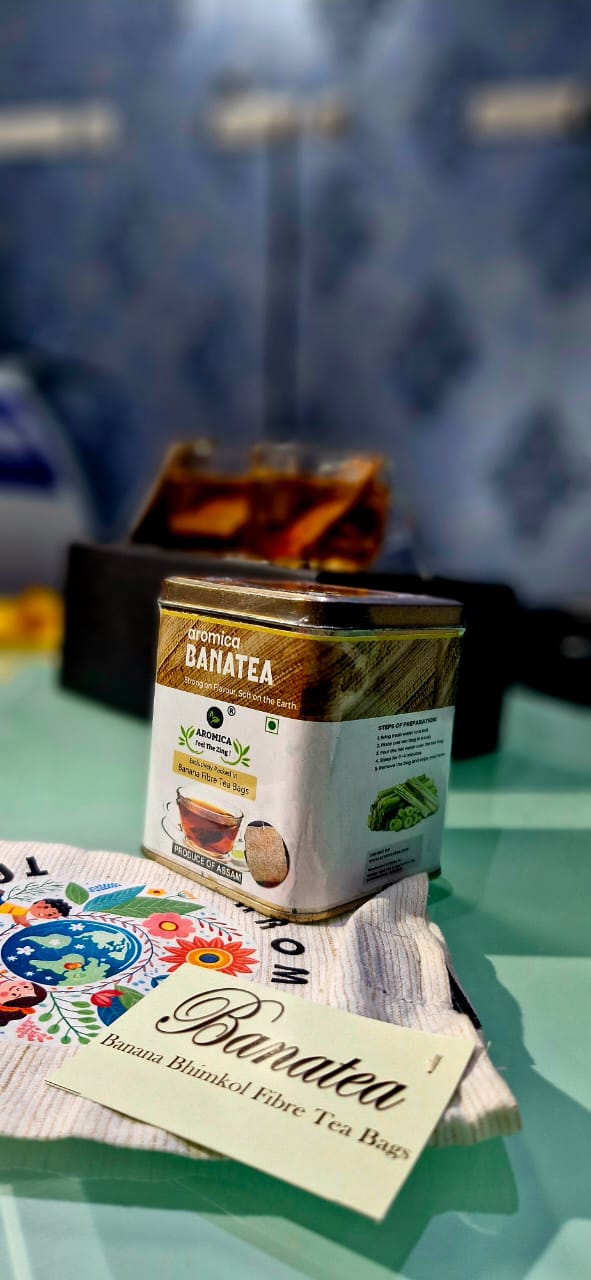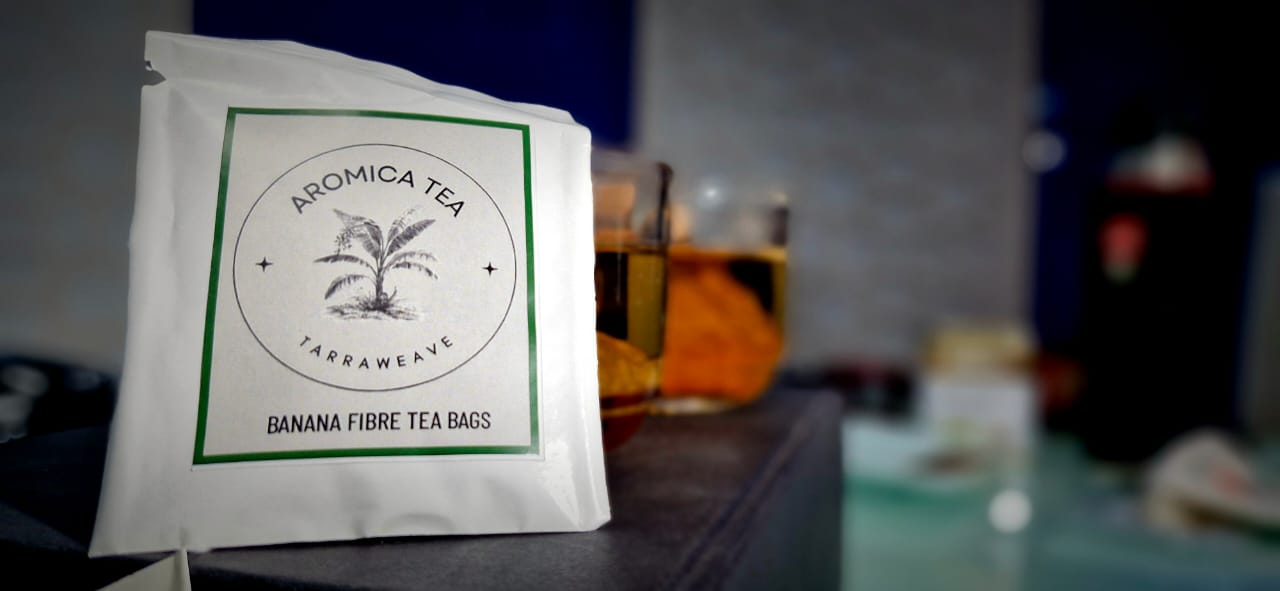
Guwahati: In a first for India's tea industry, Aromica Tea- the premium Assam-based tea brand led by entrepreneur Ranjit Baruah, has introduced biodegradable tea bags made from Bhim Kol (Musa Balbisiana Colla) native to Assam, which Baruah claims to be India’s first-ever banana fibre tea bags. Launched on World Environment Day 2025, the innovation that could disrupt how India and perhaps the world consumes tea align perfectly with this year’s global theme: "One Nation, One Mission – Stop Plastic Pollution."
Founder Ranjit Baruah told Business North East (BNE) during the interview that, the product is currently under patent processing and being tested at the Food Safety Lab in Bamunimaidam here. "When approved, it could become India’s first certified banana fibre tea bag, offering a scalable, eco-friendly alternative to synthetic pyramid bags."
The launch comes just weeks after the brand introduced UNITEA, a curated collection representing teas from all eight northeastern states and at a time when rising health concerns over microplastics in conventional tea bags are rattling global markets.

“Our endeavour is to eliminate harmful microplastics from the daily ritual of drinking tea and offer an eco-conscious alternative that’s rooted in Assam’s biodiversity and artisanal legacy,” said Baruah in an interview with BNE.
He added, this innovation will mark a critical shift from microplastic-laced synthetic tea bags to nature-sourced, health-safe packaging.
Banana Fibre with a Mission: Zero-Plastic Packaging:
The innovation is being developed in collaboration with Tarraweave Handlooms, a startup founded by textile engineer Ila Devi, known for pioneering banana fibre textiles in Northeast India.
.jpeg)
The Bhim Kol fibre tea bags are fully biodegradable, compostable, and hand-crafted using semi-mechanised production techniques. They decompose naturally and do not contribute to the silent hazard of microplastic ingestion, something increasingly flagged by medical researchers and environmental watchdogs worldwide.
.jpeg)
With a current prototype capacity of 400 handcrafted tea bags per day, Aromica is preparing for rapid scale-up. The production model uses small-scale machinery with fibre sourced from selected Bhim Kol farms across Assam, supporting local farmers and agro-waste recyclers.
“Our sourcing model is hyperlocal, Bhim Kol peels and trunks are collected from selected farms in Assam, and Tarraweave’s expertise helps refine the fibre into a clean, strong mesh suitable for food-grade packaging,” said Baruah.
“This is not a gimmick it’s a serious business model built for scale. We’re ready to automate as demand grows,” Baruah stated.
Baruah further explains, how the banana fibre is premium in feel and ethics.
Despite being a handmade innovation at present, the production model is highly scalable, with plans for automation as adoption widens. The brand is initially targeting 3–4 tea variants Orthodox, Green, CTC, and Oolong for pilot market trials. Each pyramid-style Bhim Kol tea bags for orthodox teas, complete with an envelope, is expected to retail at Rs. 9–10, at par with existing premium microplastic-containing tea bags.
However there will higher pricing tiers for exotic variants like Blue Tea, Bhut Jolokia Tea, and Oolong, depending on the infusion complexity.
While the domestic market is the initial focus, Aromica is also preparing to pitch the Bhim Kol fibre tea bags to overseas clients in Europe, Australia, New Zealand, and Canada, markets where both eco-conscious consumption and Assam teas enjoy strong equity.

“We’re talking to our overseas buyers who are actively seeking plastic-free packaging for health and compliance reasons. We believe the future lies in sustainable packaging. But we must also invest in educating tea drinkers about the unseen risks of plastic-based packaging and introduce them to eco-friendly alternatives that don’t compromise on flavor or integrity,” said Baruah.
Interestingly, the innovation doesn’t end with tea bags. Tarraweave Handlooms is simultaneously developing Bhim Kol trunk and peel-based fabrics, laying the groundwork for a broader banana fibre ecosystem in Assam, an industry that could combine agro-waste utilization, rural employment, and green textile exports.
Conventional plastic and nylon-based tea bags have been shown to leach microplastics and nanoplastics when steeped in hot water posing risks of hormone disruption, inflammation, and even carcinogenic effects over prolonged exposure.
Bhim Kol fibre, by contrast, is non-toxic, plant-based, and compostable, neutral in taste and scent, ensuring the purity of the tea’s flavour, free from industrial chemical residue and, making it suitable even for medicinal and herbal blends.
Baruah adds, “This is about protecting what’s sacred—our health, our soil, and the purity of the tea experience itself.”
Financial and Economic Impact:
By tapping into a waste-to-wealth model, Aromica is setting the foundation for rural livelihood creation, especially among banana growers, fibre extractors, weavers, and women’s self-help groups across Assam. If scaled successfully, the Bhim Kol fibre industry could emerge as a parallel green economy vertical, supplementing the region’s handloom and tea sectors with new exportable products.
Challenges Ahead:
Despite its promise, Aromica acknowledges the uphill task of consumer education. “The biggest challenge is to build awareness that tea bags aren’t always harmless. We need to make people feel the difference in their hands—and in their cups,” said Baruah.
Aromica Tea’s Bhim Kol fibre tea bag is more than a biodegradable product, it’s a strategic move toward ESG-aligned innovation, rural industrialization, and clean consumerism, emerging at the intersection of green materials, ethical sourcing, and export potential.
While initial challenges include limited supply chain infrastructure and low consumer awareness, Aromica is betting on experience-driven sampling and sustainability storytelling to turn the tide.